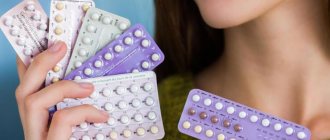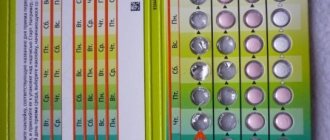Delayed periods when taking birth control pills are common. This is due to hormonal changes caused by taking the medication. With this method of contraception, individual intolerance to the drug cannot be ruled out. In this case, the doctor recommends another method of protection or replacing the product with similar properties.
The effect of contraceptive drugs on menstruation
As a result of using birth control pills, which contain hormones, certain changes occur in the body. The principle of action of contraceptives is as follows:
- the pituitary gland begins to block the active substances responsible for the functioning of the reproductive system;
- the process of follicle maturation slows down, and as a result – the absence of ovulation;
- the ability of the fallopian tubes to contract is suppressed, and for this reason sperm cannot move freely;
- cervical fluid acquires a viscous and dense consistency, which is why sperm cannot penetrate into the uterus;
- The structure of the endometrium changes and it becomes impossible for the fertilized egg to attach.
With the development of processes that occur in the body and are caused by taking the drug, menstruation becomes different. The changes are especially noticeable during the first menstruation while taking birth control pills. Discharge becomes abundant or excessively scanty.
Due to hormonal changes, menstruation may appear a little earlier or late. Its duration also changes. This largely depends on the woman’s health status and the individual characteristics of the body. You should be wary if your period starts and does not end while taking birth control pills.
Side effects
Since it was previously mentioned about the duration of use and harm to the body, we need to take a closer look at the side effects. We have familiarized ourselves with the deadline for acceptance, let’s move on to other points:
- Obesity. Although modern drugs do not add excess weight, they do affect appetite. As a result, extra pounds appear, thanks to which even your personal life comes down to the word “No,” let alone health. And for a woman, even minor fluctuations in weight can be decisive in the disappearance of menstruation.
- Hormonal imbalance. Often when taking birth control, a woman asks the question: “Is it effective?” Constant tension during sexual intercourse and regular philosophizing on this topic can lead to a nervous breakdown and hormonal imbalance. No, you shouldn’t be skeptical about this - this is the main reason for the delay.
- Incorrect prescription of the drug. Especially important for a young body. Even microdosed drugs can have a strong effect on teenage girls, and the wrong drug will lead to the disappearance of menstruation.
That is why it is not recommended to select contraceptive drugs on your own until all tests have been completed and the woman has been examined by a gynecologist.
When should your period come when taking oral contraceptives?
When taking birth control pills, your period will not start immediately and may differ significantly from the norm. Menstruation is delayed and comes three weeks after starting to use OK. The cycle is not established immediately. Over the course of several months, discharge may appear prematurely.
Sometimes menstruation does not begin after finishing taking the package (21 tablets). For the first three cycles, this phenomenon is considered normal.
Often there is a complete absence of menstruation when taking OCs for a long period. Such a cycle failure does not cause any concern. The body needs time to get used to the effects of contraceptives. As soon as the estrogen concentration returns to normal, menstruation will return on its own.
Drugs and pills that cause menstruation when delayed
The best option to find out how to speed up your periods if you are late is to consult with a specialist about choosing a drug, since some have their own contraindications.
Commonly used drugs in such cases include Duphaston, Pulsatilla, and some other oral contraceptives.
"Duphaston" for delayed menstruation
The hormonal drug Duphaston can be prescribed by a doctor if your period is late; it is not recommended to take it on your own.
In case of scanty periods and a delay that is not a consequence of successful fertilization, Duphaston is prescribed in the second half of the cycle for two to four months. This time should be enough to normalize hormonal balance. After taking this drug, menstruation should begin within 3-4 days.
This drug replenishes the hormone progesterone when it is deficient. You should not take this remedy to terminate an unwanted pregnancy, as your period may never begin, and harm to your health will be caused.
"Pulsatilla" for delayed menstruation
The homeopathic drug "Pulsatilla" is made on the basis of natural plant materials and is available in the form of granules. This remedy is often prescribed by doctors for delays in menstruation, but in the absence of pregnancy.
To normalize the cycle, the drug must be taken for a long time. 6 granules are placed under the tongue until completely absorbed, twice a day, morning and evening.
When the normal cycle is restored, Pulsatilla is taken as a preventative measure, 5 granules once a day, every other day. It should be borne in mind that certain products - chocolate, coffee, alcohol, tea - significantly reduce the effect of a homeopathic remedy.
Oral contraceptives
There are a large number of combined contraceptives available in the form of tablets - they are analogues of the female hormone progesterone.
Drugs can be prescribed, including when the cycle is disrupted - they help restore it. The most used include “Sileste” and “Marvelon”. These remedies ease the pain of menstruation and shorten their period, and will also help with their delay. They are used as prescribed by a gynecologist.
Reasons for missed periods when taking OK
If menstruation does not occur on time, many women begin to suspect pregnancy. In fact, the absence of menstruation when taking contraceptives is due to such reasons as:
- non-compliance with the rules for taking contraceptives;
- poisoning, as a result of which vomiting was caused and the drug left the body;
- consumption of alcoholic beverages that reduce the effect of the medication;
- taking antibiotics, which also reduce the effectiveness of the drug;
- purchasing a low-quality drug.
The reason why you don't get your period isn't always due to birth control pills. These may be symptoms of illness or the result of exposure to external factors. Lack of menstruation is often caused by:
- stress, nervous tension;
- excessive physical activity;
- strict diet;
- changing climatic conditions;
- pathologies of the genitourinary system;
- inflammation of the uterus or ovaries;
- sexually transmitted infection;
- taking other medications in parallel with contraceptives.
You shouldn’t figure out on your own why you don’t have your period. The right decision is to seek help from a gynecologist.
Why may there be a delay when stopping birth control pills?
So, in what cases does a delay occur after taking birth control?
- The first thing to rule out in such a situation is pregnancy. Some factors, such as diarrhea, vomiting, alcohol, changes in time zones or climate, as well as simply missing a pill, reduce the effectiveness of COCs. And the contraceptive effect decreases.
- It is not uncommon to experience a delay in menstruation after taking emergency contraception. Especially when used uncontrolled. The fact is that “firefighter contraceptives” contain a very high dosage of hormones, which is a powerful stress for a woman’s ovaries. The consequence of “withdrawal syndrome” may be a delay in menstruation after taking Postinor.
- There is a high probability that very young people, women over 40 or closer to menopause will experience “no periods” after stopping birth control. Menstrual function in women over 40 years of age and older recovers more slowly and more difficultly due to age-related changes in the body, and in young girls, cycle disruptions occur due to the immaturity of the reproductive system. But these problems are short-term, provided that there is no other pathology.
- Unauthorized stopping of taking pills, as mentioned above, is also a cause of menstrual delays.
- Inflammatory diseases of the genital area also lead to irregular periods.
All modern COCs (whether Jess, Yarina, Lindinet, Qlaira, Regulon, Diane-35, Novinet, Belara) are classified as monophasic drugs containing the same dose of estrogen in each tablet and differ in the gestagen component. The only difference is that some of them (for example, Jess, Yarina, Diane-35) also have an antiandrogenic (cosmetic) effect.
Note! A delay in menstruation may occur due to discontinuation of any of these drugs, especially if:
- there was a missed pill or the time of taking was shifted;
- reception was stopped without permission, packaging was not completed;
- during use, vomiting, diarrhea, alcohol consumption, and combination with antibiotics are observed;
- Against the background of reception, there are strong shocks, changes in climatic conditions or time zones.
Selection rules OK
The selection of the drug should be carried out exclusively by a gynecologist. The same oral contraceptive method may not suit all women.
When choosing, take into account age, regularity of intimate life, childbearing experience and body characteristics that determine hormonal levels. Only in this case will it be possible to choose a drug that will not harm your health.
To make a decision, the doctor takes into account the constitutional type:
- Estrogenic. Women are short, with well-developed mammary glands. Their menstruation is heavy and long. In this case, it is recommended to take birth control pills Rinevidon, Triquilar, Logest.
- Progesterone. A distinctive feature of representatives of this type is their tall stature and masculine appearance. They are characterized by oily skin, small mammary glands and scanty, short menstruation. The best option is the use of drugs Yarina, Diane-35, Jess.
- Mixed. Women of this type combine the characteristics of the other two. Most often they are prescribed Mercilon, Novinet, Regulon.
Why choose OK?
Of course, the main function of contraceptives is to protect against unwanted pregnancy.
But girls and women choose this method for other reasons. The main one is the effect on the menstrual cycle. Hormonal agents allow it to be stabilized - menstruation will no longer be an unpleasant surprise, since the woman will learn about their occurrence 1-2 days in advance. Menstruation itself occurs more quickly and painlessly when taking OCs. Signs of PMS manifest themselves more mildly or are almost invisible.
Another useful function of OK is that they help improve skin condition. Therefore, these contraceptives are often prescribed to girls who are not sexually active.
The fact is that the tablets contain estrogen, which suppresses another hormone - androgen, which is responsible for the production of sebum. But OK is not a panacea for acne.
After all, the causes of skin rashes are different and are not always hormonal in nature.
My period started while taking birth control pills. Why is this happening? To understand the issue, we need to imagine how these drugs affect the female body.
OCs contain a certain amount of hormones. They are the active elements here:
- When exposed to the drug, the pituitary gland blocks the production of biologically active substances that ensure reproductive function.
- The maturation of the follicle with the egg is inhibited. As a result, ovulation does not occur—the release of the egg “to meet” the sperm. After all, this cell is immature, unready.
- The contractility of the fallopian tubes decreases. Consequently, it becomes impossible for sperm to move through them.
- Cervical fluid becomes more viscous and dense in composition. This blocks sperm from entering the uterus.
- The structure of the endometrium changes. Even if the egg has been fertilized, it cannot attach to the lining of the uterus. Why will it remain without food and die.
If you get your period while using birth control pills, there is no reason to worry. Failure of the menstrual cycle when taking OCs does not always indicate serious reasons, such as pregnancy. However, this is a sufficient reason to contact a gynecologist.
Today, experts widely recommend contraceptives such as hormonal drugs to patients. The point is the obvious advantages of OK:
- Elimination of PMS. The woman stops suffering from severe aching pain in the lower abdomen and headaches.
- More scanty menstruation. Since the body loses less blood, this reduces the risk of developing iron deficiency anemia.
- The likelihood of developing diseases such as endometriosis or ovarian cancer is reduced.
- If a woman already suffers from endometriosis, then OCs help mitigate the manifestations of this disease.
- Bones become stronger, skin condition improves, acne is eliminated, and hair looks healthier.
- Hormonal contraception guarantees high (but not one hundred percent) protection against unwanted pregnancy (including ectopic).
- If a woman continues to take hormonal contraceptives during perimenopause, the symptoms of menopause are alleviated.
Can I take birth control pills during my period? All questions about OK for a girl or woman should be answered by her attending physician. After all, these are medications, the use of which may be accompanied by side effects:
- Headache.
- Change in appetite.
- Unreasonable mood swings.
It is important to understand that hormonal drugs have a number of contraindications:
- High blood pressure.
- Risk of vascular thrombosis.
- Serious general diseases.
If a woman has just started taking birth control pills, her periods may be unstable. This phenomenon should not be alarmed - it is observed in 80% of those who switch to hormonal contraception.
Moreover, the destabilization of the cycle occurs completely differently in different women. It all depends on the state of their endocrine and reproductive systems:
- Too scanty or, on the contrary, intense menstruation.
- Menstruation ends sometimes earlier and sometimes later than expected.
If you get your period while taking birth control pills, why does this happen? Let's look at all the reasons.
If everything is fine with the woman’s body, when taking birth control pills, periods go as usual. The deadlines do not change.
Start taking birth control pills during your period. Usually on days 1-5 of menstruation. The nature of the discharge also does not change.
When your periods are scanty while taking birth control pills, there is no reason to worry if this is the beginning of the transition to OK. Scanty menstruation will persist until the next cycle.
This is explained by the influence of the hormones that make up the OC.
Why changes in the menstrual cycle are not an alarm signal.
If destabilization continues for more than 3 months, the woman feels unwell and notes other incomprehensible symptoms, there is a reason to consult a doctor to change or discontinue the drug.
What caused your period to start while on birth control pills? Menstruation is a normal physiological process of cyclical changes in the functions of the female reproductive system.
Outwardly, this is manifested by bloody uterine discharge, called menstruation, menstruation. During this cycle, the female body prepares for conception and pregnancy.
If fertilization of the egg does not occur, the cycle repeats again.
The menstrual cycle is a hormone-dependent process. Therefore, it is also influenced by OCs containing hormonal elements.
After menstruation (the release of dead unfertilized eggs and endometrium), the female reproductive system is busy growing new eggs, which become ready for fertilization 13-14 days after the end of menstruation.
If this happens, menstruation occurs again with the removal of unnecessary swollen (to secure the eggs) endometrium.
Why do I get my period while taking birth control pills? After all, the ovaries “rest” at this time; the eggs do not mature. This means that there is no ovulation. If you get your period while taking birth control pills, this is not due to the death of the endometrium and the preparation of the uterus for a new menstrual cycle. This phenomenon occurs due to the body’s reaction to the discontinuation of OCs.
As a rule, according to the prescribed prescription, a woman takes a pack of the drug (21 tablets). Then she takes a break of 7 days. At this time, menstruation begins. It is caused by a sharp decrease in the concentration of female hormones in the body, which is the cause of endometrial rejection. This phenomenon is normal. And it just means that the right contraceptive was selected for the woman.
Sometimes conception occurs because the patient neglected the doctor’s recommendations: she took pills at the wrong time, or skipped taking them. Therefore, if there is no menstruation during the break, it would not be superfluous to conduct a pregnancy test and appear for an ultrasound of the pelvic organs.
You can often find similar messages on women’s forums: “I’m taking birth control pills and my period started—what is this?”
If we look at medical statistics, 30% of women experience intermenstrual bleeding within 3 months after switching to hormonal contraception. Sometimes this period lasts up to six months.
According to the same statistics, this most likely occurs when taking low-dose contraceptive medications (containing no more than 20 mcg of estrogen).
Often this dosage is not enough to establish a stable menstrual cycle.
That is, in this case, the endometrium begins to be shed earlier than expected. As a result, the woman Fr. But this phenomenon does not indicate a decrease in the effectiveness of prescribed drugs. That is, pregnancy does not occur when such a symptom occurs.
If such bleeding continues, there is no need to cancel hormonal contraceptives. You just need to pay more attention to personal hygiene issues.
If the bleeding does not stop 3 months after the prescription of OK, you should think about changing the drug. Intense discharge should be especially alarming. But it is better not to “self-prescribe” a new drug.
The right way out of the situation is to contact your gynecologist.
But if bleeding is observed, on the contrary, towards the end of the package of tablets, this indicates an insufficient content of the gestagen element in the product. It may be necessary to choose an OC with a different type of this hormone.
But bleeding does not always only indicate an incorrectly selected hormonal drug. Intermenstrual discharge may be a consequence of this:
- The woman forgot to take several pills in a row, to which the body responds with a menstrual reaction.
- Addiction to smoking (it slows down the production of estrogen).
- Taking medications that are incompatible with OK.
- Infectious diseases affecting the genitourinary system.
Quite intense bleeding is often observed when using hormonal contraceptives, which occurs at the wrong time.
If a woman takes only the first pack of OCs, this may indicate rupture bleeding. It is connected with the adaptation of her body to hormonal drugs.
The fact is that active progestogens cause active death of the endometrium. This ultimately triggers menstruation.
At the same time, modern contraceptive drugs contain quite a bit of estrogen, which in this case performs a hemostatic function.
Rules for drug withdrawal
Women are often afraid to stop taking birth control pills and continue taking them after a seven-day break. In fact, when you give up contraceptives, the body’s adaptation process occurs quickly. The main condition that must be observed is to stop using the drug after finishing the package. If everything is done correctly, bleeding will soon appear. If you don’t have your period after stopping OK, you should consult a specialist.
In order for the body to more easily accept the withdrawal of the medication, you need to adhere to the following rules:
- consult a gynecologist. In some situations, stopping taking OCs is strictly prohibited;
- Using laboratory tests, determine the level of sex hormones;
- finish the package you started. Quitting the drug in the middle of the cycle is a serious stress for the body. In this case, severe bleeding is possible.
It is worth noting that after finishing the first pack, you do not need to immediately start a new one. Doctors strongly recommend taking a break of one week.
Delay in taking OCs is a fairly common occurrence. It is caused in most cases by hormonal changes in the body. After a short time, the cycle is established, and even after discontinuation of OK, periods come exactly on time. If violations occur for a long time, you should definitely consult a gynecologist.
What to do if you “missed your period” after stopping COCs?
First of all, don't panic!
Secondly, remember, did you have any omissions in taking pills? If yes, then answer one more question: was there any unprotected sexual intercourse in this case? Yes? In this case, your delay may be due to pregnancy. Take a test to confirm and go to the antenatal clinic. The doctor will prescribe a blood test to determine hCG (pregnancy hormone) and an ultrasound.
If you took the drug according to the rules, pregnancy is excluded, then a missed period is more likely a minor glitch, and everything will recover by itself. Menstruation will resume next month.
Delays in menstruation for a long time (more than 3 months) will require the help of a gynecologist-endocrinologist and additional examination. In this situation, it will be necessary to exclude ovarian cysts, malignant tumors, and inflammatory processes in the genital area. An in-depth study of hormonal levels (FSH, LH, prolactin, testosterone), and pelvic ultrasound will be required.
But when taken correctly, the abolition of contraceptives does not affect women's health and does not disrupt menstrual function.
Reasons for the absence of menstruation after taking OK
The absence of menstruation while taking hormonal contraceptives and at the end of this period raises many questions. Why is your cycle disrupted when you take birth control pills and what to do in this case?
Oral contraceptives are convenient because they are very reliable and protect almost 100% from unwanted pregnancy. And menstruation becomes regular while taking them, usually starting every 28-30 days at the same time of day. But there is also the absence of menstruation while taking birth control pills (OCs). This is due to the very low content of hormones in modern tablets. Because of this, the endometrium does not grow much at all. And bleeding after finishing a box of pills, if it happens, is very scanty. By the way, knowing this feature, these drugs are often prescribed by doctors not only for the purpose of contraception, but also for heavy menstruation caused by endometriosis or uterine fibroids, for example. And one more interesting point - menstruation when taking birth control is simply a reaction of the endometrium to a sharp drop in hormone levels. Menstrual-like bleeding is what doctors call it. It can last 3 days, and this will also be the norm.
The reasons for the absence of menstruation when taking OCs, as we said earlier, may lie in the peculiarities of the drug’s effect on the endometrium. But this needs to be confirmed. That is, exclude pregnancy. The reasons for the absence of menstruation after finishing taking the pills from the package, that is, a seven-day break, can be caused precisely by pregnancy.
Why do pills sometimes fail? There may be several reasons for this. But most often these are violations of their intake.
Delay in menstruation 10 days: how to induce menstruation?
To induce menstruation if you are late at home, you can use the following methods:
- taking medications that will reduce the level of estrogen in the blood and also increase the contractile activity of the uterus in order to reject the endometrium;
- activation of blood circulation in the uterus using thermal procedures;
- folk remedies.
Let's look at each method in more detail.
What drugs can induce menstruation during pregnancy?
If pregnancy is undesirable, a gynecologist can perform a medical termination using the drug Mifegin. This drug is used only in a medical facility under the strict supervision of qualified personnel, as it can cause a deterioration in the woman’s condition.
If a woman has had unprotected sexual intercourse, she can take the drug Postinor, which contains levonorgestrel.
Taking the drug Postinor shortens the luteal phase of the menstrual cycle and causes menstruation.
Postinor is effective only in the first three days after unprotected sexual intercourse.
The dose of Postinor is two tablets: 1 tablet every 12 hours.
You also need to know that Postinor cannot be used more often than once every six months.
How can you induce menstruation with Duphaston or Utrozhestan?
If the test is negative, but your period does not come, then Duphaston and Utrozhestan, which belong to the drugs that induce menstruation, will help. These drugs contain progesterone, so they are mainly used for insufficiency of the luteal phase of the menstrual cycle.
How do birth control pills affect menstruation?
Birth control pills may prevent ovulation
Birth control pills contain various hormones that prevent pregnancy. Such hormones are capable of:
- prevent ovulation;
- thin the lining layer of the uterine wall (endometrium) and thus prevent implantation of a fertilized egg;
- cause thickening of the cervical mucus, which prevents sperm from reaching the egg.
Birth control pills are usually taken at weekly intervals. At the same time, tablets for the first three weeks contain hormones, and tablets for the last week do not contain active substances. In fact, in the fourth week, women take a placebo, which simply helps them remember to take birth control pills daily.
When taken correctly, birth control pills are one of the most effective methods of contraception with a guarantee of protection against unwanted pregnancy of about 99%.
However, women often miss doses. In addition, if a woman vomits, her body may have difficulty absorbing the active ingredients of the tablets. These factors impair the effectiveness of oral contraceptives, thereby increasing the risk of unwanted pregnancy and breakthrough bleeding.
The nature of discharge when using OK
It takes about 3 months for the body to adapt to contraceptives. Therefore, the first 3 cycles after starting to take OCs may be unstable and very different from each other and from what happened before. This is normal, so you should continue to take the drug as prescribed.
With a stable cycle, bleeding occurs 2-3 days after taking the last pill. There may be a delay of 4-5 days, especially if there have been problems with this before. But usually OK, on the contrary, normalize the cycle. Of course, if they were selected correctly, taking into account the individual characteristics of the body.
Menstruation after birth control pills is scanty. They are less painful and end faster. In the first cycle, menstruation may not occur. This occurs due to the thinning of the endometrium and its unpreparedness for pregnancy. The opposite situation is also possible, when spotting continues until the next menstruation. This is also a variant of the norm.
If, after establishing a cycle, intermenstrual bleeding occurs, you should think about changing the drug. The appearance of discharge in the first half of the cycle indicates that the concentration of estrogen in the tablets is low. In this case, you need to choose a product with a higher dosage. If blood appears in the last 2 weeks before the expected period, the problem is an inappropriate synthetic analogue of progesterone. In such a situation, you need to give preference to another manufacturer.
A delay in menstruation during the first three months, provided that all admission rules are followed, should not be scary. But if deviations are observed later, you should consult a gynecologist. It also wouldn't hurt to take a pregnancy test. Oral contraceptives do not provide a 100% guarantee of protection. In addition, their effectiveness may be reduced. This happens when you skip pills, use antibiotics or drugs based on certain herbs at the same time, diarrhea or vomiting.
In a normal situation, heavy periods after birth control pills are impossible. Such discharge appears when the drug is not taken in compliance with the norms and indicates a lack of effectiveness. It could also be a disease of the reproductive system. In addition, complications may be suspected if the cycle does not return to normal for more than 3 months.
Does missing period mean pregnancy?
Even if you take birth control pills correctly, there is still a small chance of getting pregnant.
Pregnancy is one of the many reasons for missing periods.
It is important to understand that a woman can become pregnant even if she is taking birth control pills correctly. Therefore, every sexually active woman who does not have her period needs to purchase an appropriate test or meet with a doctor.
The chances of getting pregnant with proper use of oral contraceptives are extremely low, but they increase if a woman misses pills. In most cases, pregnancy occurs when a woman misses two or more doses in a row.
In addition to the absence of menstruation, signs of pregnancy include the following:
- nausea and vomiting;
- breast tenderness;
- weakness, slowness, fatigue;
- aching pain in the lower back;
- frequent urination.
Some of the listed signs may appear as early as a week after the absence of menstruation. If a woman does not experience the expected menstruation and has one of the symptoms of pregnancy, she needs to see a doctor.
Is it harmful to take contraceptives to delay your period?
Any interference with the natural female cycle of hormone production has negative consequences. Here are some problems that may arise when you try to delay your period on your own:
- often, after a delay in menstruation, a serious disruption in the reproductive system may occur: menstruation may disappear for an indefinite period;
- With this method of postponing menstruation, it is necessary to take into account your age, the presence of concomitant diseases and the presence of bad habits. So, for example, if a woman is over 35 years old, she smokes or has problems with blood clotting, then even short-term use of hormonal contraceptives can lead to thrombosis of the veins of the lower extremities;
- in case of chronic diseases of blood vessels and heart, liver or kidneys, very serious consequences can occur after taking contraceptives, often resulting in death.
These negative consequences can occur if a woman decides to self-prescribe any drug to delay her period. If this is done by a specialist who takes into account all the contraindications and the general condition of the patient’s body, then a one-time drug delay in the onset of menstruation will not lead to negative consequences.
Anastasia Krasikova, obstetrician-gynecologist, especially for Mirmam.pro
Impact of Cycle Time
When more than three months have passed since the start of the course, and when taking contraceptives, discharge marks a specific period of the monthly cycle, there is no need to immediately suspect pathology. Minor bleeding may begin due to hormonal conditions or the pills themselves.
Even more interesting:
Sores around the head
Mouth ulcers hiv
After menstruation
If a woman has taken a break after the blister pack (21 tablets) or has finished taking placebo pills (28 tablets in a strip), then cleansing the uterus is allowed for two to three days. The blood clots remaining inside after menstruation come out, and spotting occurs after menstruation.
Even dark brown discharge after menstruation occurs due to too low a dose of estrogen, which, unlike progesterone, stops the rejection of the mucous layer of the uterus. It is necessary to choose another drug, but before that you should consult a doctor; you cannot take other oral contraceptives of your own choice and desire.
During ovulation
The following factors can provoke brown discharge in the middle of the cycle when taking birth control pills:
- lack of synthetic estrogens;
- lack of gestagen;
- natural processes.
When you take the OC (“mini-pill”), the egg develops and leaves the follicular sac, causing a small amount of blood in the cervical fluid.
After ovulation
The most common cause of bloody discharge before menstruation after taking modern contraceptive methods is a lack of progestogen. It is still impossible to exclude pregnancy when the order of the pills was disturbed or a day was missed (bloody secretion on days 6–12 after ovulation).
There are also situations when a woman notices brown discharge instead of menstruation when taking OK. Natural progesterone rises after ovulation, preparing the body for the expected menstrual bleeding. When there is not enough hormone, the endometrium does not shed in time, causing a delay. But if you take Jess or other microdosed contraceptives, pseudo-menstruation may appear instead of menstruation. In the most advanced cases, a woman’s cycle is disrupted, which is why there are no monthly bleedings. Read about spotting after taking Jess in the article at the link.
Advantage of oral medications
It should be remembered that any drug, firstly, is a harmful hormone, and it is advisable to drink it according to the recommendations of a doctor. Statistics show that during painful critical days after taking medications, a woman feels calm. The bad feeling in the back and lower abdomen decreases, and there is also less discharge. In addition, these days end faster than usual. Such manifestations affect the blood and hemoglobin increases.
Another nice thing is that the cycle is restored in a couple of months for those who had problems with it. When you have very scanty periods, there is no need to be afraid of this, this development is considered normal.
During the seven-day break when taking contraceptives, menstruation does not occur. But you should not get carried away with the method, since as a result, bleeding may begin between menstruation.
It should be borne in mind that while taking the pills, menstruation is natural. This condition is called menstrual-like reaction.
What does this mean? At the time of the seven-day pause, separation of the endometrium occurs due to a decrease in hormones. Girls come to this type of protection because with its help you can actually restore the cycle. Doctors also consider this method good. But at the same time, you need to be examined to know why the failure occurred. If this has already happened and you have already stopped taking contraceptives, your period may begin to be delayed. And again it will fail. From this we conclude that such drugs do not need to be used to improve the cycle. When the failure occurs monthly, it is better to consult a doctor and he will prescribe the necessary medications.
Contraceptive medications have both positive and negative sides. Both girls and health workers must know them. Let's look at the bad side of drugs:
- Chronic diseases;
- Heart diseases;
- Disruptions of the menstrual cycle;
- Overweight. Every body reacts to hormones in a variety of ways. Not only does your weight increase, but so do the hairs on your skin. The person also begins to sweat and the breasts may become enlarged;
- Pigmented skin;
- There is no desire for sex or it is very strong;
- Impaired mental state;
- Nausea, migraine, dizziness. Lack of or increased appetite;
- Pregnant and nursing mothers. And also for those who drink and smoke;
- The appearance of irritability. When a woman feels unwell while taking pills, it is advisable to observe the mood of the body or go to a specialist. The drug is often changed.
Dangerous symptoms
But brown discharge when taking birth control pills may not always be considered normal. Causes of concern should be:
- constant discharge when using contraceptives throughout the course;
- if the discharge appeared after accidentally missing 1-2 tablets;
- against the background of alcohol consumption;
- when prescribing another drug.
Any violations during drug therapy using contraceptives can cause side effects in the form of bleeding. But if this happens against the background of the listed facts, then this situation should become a cause for concern. Any instructions warn that it is advisable to avoid drinking alcohol during use. The prescription of other medications should be agreed with the attending physician. Other medications reduce the effectiveness of contraceptives, causing side effects.
Rebound effect
Every woman who takes oral contraceptives knows about the rebound effect. After stopping the pills, the hypothalamic-pituitary system begins to intensively produce hormones that affect the functioning of the ovaries. The egg matures, ovulation occurs and fertilization occurs even in those women who could not become pregnant for a long time. The “withdrawal effect” is actively used in gynecology in the case of some forms of anovulation and infertility as a fairly quick and effective way to achieve a long-awaited pregnancy.
The maturation of two or more eggs in one cycle is another feature of taking OK. After stopping the drug, many women are surprised to learn that they are expecting twins or even triplets. This phenomenon is also associated with excessive stimulation of the ovaries. As a result of a hormonal attack, several eggs mature and fertilize at once. This effect disappears 3 months after stopping the drug.
Features of recovery after canceling OK
Experts believe that if you use contraceptives for 3 to 6 months, pregnancy can occur quite quickly. Since the ovaries, impaired in their productive function for some time, after the cessation of exposure to synthetic drugs, begin work on growing eggs with redoubled force.
Gynecologists even use this method of treatment for cases of failure in the process of cell formation. OCs are prescribed for 3 months to stimulate normalization of cell growth after their discontinuation. According to medical observations, pregnancy in such cases occurs after about 24 months in 85% of nulliparous women and in 95% of those who have given birth.
The first ovulation after stopping OK is an individual phenomenon. If impatient people believe that the release of the egg will occur immediately after stopping the medication, then this opinion is wrong. A woman over 23 years old who has been protecting herself from pregnancy with hormonal pills for several years may need a year to recover. For a lady 30 years or older, the waiting period can last up to 5 years. All processes depend on the state of the body during this period of time.
Painful ovulation is sometimes possible after discontinuation of OCs. But this is not observed often. The passage of the period without taking OCs occurs differently for each woman, with signs and sensations unique to her.
Since the recovery process is different for everyone, late ovulation is also possible after stopping OCs. The woman’s reproductive system must again begin to reproduce hormones on its own when they stop coming in large quantities from the OC. The first months of such adaptation pass with disturbances in the rhythms of menstruation. It lengthens significantly, thereby shifting the day of release of the reproductive cell. Adjusting this process may take 3 months or more.
Calculations in case of rhythm failures do not give any results. Therefore, the moment of follicle rupture can be determined using saliva or urine tests, measuring the temperature rectally and keeping a graph of changes, as well as simply listening to your feelings. Breast tenderness and a slight nagging pain in the lower abdomen will tell you that the desired date has arrived, even if not at the moment you expected.
What do oral contraceptives affect?
OK, containing sex hormones, has a depressing effect on the process of cell formation, namely:
- inhibit the maturation of the egg;
- reduce contractility of the fallopian tubes;
- increase the viscosity of cervical mucus.
All this interferes with the fertilization process, since the cell is immature, and sperm in this state of the reproductive system cannot penetrate the tube. Changes in the endometrium do not allow the embryo to attach to its wall.
If you want to get pregnant, stopping these medications is easy. It is only necessary not to abruptly stop taking it in the middle of the cycle, but to take the course before your period, so as not to cause too much bleeding. But restoration of reproductive function takes a sufficient period of time. Therefore, the question of when ovulation occurs after discontinuation of OCs remains quite relevant.
On average, the female body is able to return to normal and regenerate reproductive function from 6 to 12 months. In this case, the following factors play a role:
- age;
- state of the immune system;
- what contraceptive did you take;
- presence of diseases.
So, it’s difficult to say on what day ovulation will occur after stopping the OC, here the count goes on for months. Since the body received hormones in sufficient quantities while taking the pills, the production of its natural ones slowed down. And it takes time to restore the natural process. It is believed that each year of taking OCs adds 3 months to the recovery period.









